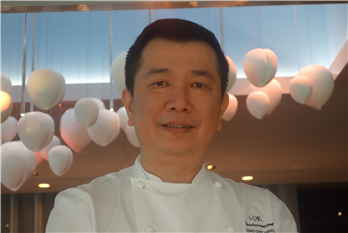Tong Chee Hwee
Interviewed October 2013
Q How long have you been cooking professionally?
A. I started my career in 1982 in Singapore, in a famous Cantonese restaurant called Happy Valley. Aside from two years of study in China, I have worked for 32 years in total in the food industry.
Q. Where did you train to cook?
A. In my very first job in the Happy Valley in Singapore.
Q. How would you describe your style of cooking?
A. I always follow the most traditional and authentic flavours possible when I’m cooking a particular dish. However when I’m cooking I also trying to find a modern way to execute and present a dish. For example, with the famous pork dish Dongpo Pork Belly, the traditional way requires 4 hours of slow cooking in a clay pot. When I’m cooking the Dongpo Pork I choose to use the water bath technology, which involves bathing the pork belly in 58◦C for 16 hours instead of cooking it in the pot. The result is that the pork belly maintains its authentic flavour while still holding the essence inside the meat. Also traditional Chinese cooking includes using a huge amount of oil, but in the modern culture this is not considered healthy, so for a healthy diet I usually try to find a way to use less oil when cooking a dish.
Q. Is there a secret for a successful restaurant?
A. In my opinion the focus of a restaurant should always be the food quality. It is very important to always ensure your customer receives the same excellent standard of food every time they visit. And I always focus on serving the customer and making them feel satisfied about the experience, with regards to both the food and the service.
Q. Do you have a "signature dish" or favourite dish you enjoy cooking?
A. When I was at Hakkasan I very much enjoyed cooking the black pepper beef rib-eye. After I opened HKK my signature dish became the Cherry Wood Roasted Peking Duck, and right now I’m working on my next signature dish, which I haven’t yet quite decided on.
Q. Do you have a favourite ingredient?
A. I love Chinese herbs and products, such as goji berries. They are really good when cooking Chinese soups.
Q. Which restaurant do you most enjoy eating at on your night off?
A. Mostly Szechuan restaurants, such as Ba Shu.
Q. What is your most interesting or fun experience from your time in restaurants?
A. I remember when I was still back in Singapore, one night we were doing a normal service in the restaurant and all of a sudden a customer rushed into the kitchen calling the name of my mentor chef. He looked quite drunk, we were a bit scared because normally the kitchen is not a safe place for a drunk man, considering all the hot oils and knives etc. However, all he asked my mentor chef was to teach him how to make a dish. We all laughed out at both of them, that was a very unforgettable experience for me, very interesting and funny.
Q. What would be your "last request" dish?
A. As a Chinese man I’m pretty sure no matter what it would be, it must have steamed jasmine rice to accompany it.
Q. Is there another chef that you most admire?
A. Yes, for example the Spanish chef Ferran Adrià, I was amazed with his “molecular gastronomy” when I visited El Bulli, when it was still there.
Q. Any advice you would give to someone wanting to become a chef?
A. Firstly it is very important to find a good mentor with a lot of experience, then it pretty much depends on the person’s will to work hard, perseverance, not afraid of failures, etc.
Q. Any final thoughts you'd like to share e.g. new developments at the restaurant?
A. I think being a chef one always has something new to learn, one can never say he has learnt everything there is to learn about cooking. This is a long road with no finish line, and I hope I can learn as much as I can on the way.


